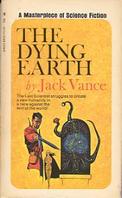The version of this book that I read was published by Lancer and doesn't appear to have an ISBN. I don't think it's the original 1950 printing, but it doesn't say on it when it was printed.
This was, unfortunately, not at all the book that I was hoping that it would be.
For one, don't let anyone convince you that this book is science fiction, or even that "science and fantasy are deftly mingled." No, they're not. There isn't any science to be found here, vat-grown humans non-withstanding. This is a pure fantasy pulp adventure novel that just happens to use the far future as a justification for magic instead of more traditional explanations (or the lack thereof).
Unfortunately, neither is much actually done with the idea that this is Earth late in its lifespan. It's certainly a constant part of the background, with the sun hanging red in the sky and a sense of constant ruins and forgotten pasts underlying civilization, but really little of this feels significant, or remarkably different from a civilization built over the ruins of another. The idea the world is dying is background only, nothing more.
All the signs of the pulp adventure novel are thick on the ground here. There is the flowery and elaborate language seeking to invoke a sense of wonder at every turn, the rudimentary and barely functional dialog, and the adventuring male heroes and mystifying women. Most of the background makes me feel like someone is trying to write an elaborate description of an original series Star Trek set, fair bludgeoning the reader with the Mysterious and Strange.
As you can probably tell, this isn't really my genre. I know there are people who just love this writing style, and if that's you, you may well like this book; it seems as well-written as any, and did keep me involved enough to finish it in a night. (The Dying Earth by itself is quite short; you're more likely to find it in Tales of the Dying Earth, which includes it and three other novels. I happend to pick up just the original single novel used.) The second to last story is the best of the lot, doing a pretty good job showing the basics of a civilization trapped in a thousand years of civil war because that's just how things work.
That being said, I found the characters wooden and mostly uninteresting, even the final character, the one who can't stop asking questions, who's the best of the lot. The world never acquires much in the way of depth, and the obstacles and villains feel rather like refugees from B movies (and I don't find cheese anywhere near as much fun in writing as in a movie).
I'm probably not the best person to judge this book, and if you like the pulp adventure genre, do look elsewhere for other opinions. But if you're mostly a modern fantasy or science fiction reader who never quite saw what people loved so much about the original Star Trek series (basically my stance), I'd recommend avoiding this one.
Followed by The Eyes of the Overworld.
Reviewed: 2004-04-12
